 | | | The Rachel Carson Council Campus Network (RCCN) has seen a blur of activity this fall as the RCC staff has returned to in-person, on-campus educational and organizing visits, adding two new campuses -- North Carolina Central University (NCCU), the nation’s oldest public HBCU, and the University of Wisconsin – Madison, a leader in climate and sustainability research and education. During October, in addition to NCCU and Wisconsin, RCC President & CEO, Bob Musil also spoke at member campuses Catawba College, Duke University, and UNC – Wilmington. RCC Assistant Director for Climate Justice, Bella Jaramillo also organized and spoke in northern Florida, including appearances at Florida State University (FSU) and Florida A&M (FAMU) University, another HBCU. And, at RCC member campus UNC-Greensboro, Associate Professor Etsuko Kinefuchi organized and drove a contingent of students across the state to Wilmington. There they were a major presence aboard the Henrietta for the RCC-sponsored Cape Fear River boat cruise led by RCC Assistant Director Claudia Steiner to observe and learn about the clear-cutting of forests, water and air pollution, and climate change caused by wood pellet production.  Colleges and universities are also at the center of this year’s hotly-contested mid-term election which has the potential to erode gains for the environment, women, diversity and inclusion, free speech, even democracy itself. But the good news is that the Tufts University Center for Information and Research on Civic Learning and Engagement expects students to continue a pattern of increased voting turnout which will likely aid those candidates in favor of environmental and other progressive issues. In the very tight race for the U.S. Senate in North Carolina, for example, where the RCC has 15 active campuses, the Democratic candidate, Cheri Beasley, wants to take action on climate change and environmental justice and has been endorsed by the League of Conservation Voters while the Republican candidate, Ted Budd, remains a climate denier and has been endorsed by Donald Trump. Colleges and universities are also at the center of this year’s hotly-contested mid-term election which has the potential to erode gains for the environment, women, diversity and inclusion, free speech, even democracy itself. But the good news is that the Tufts University Center for Information and Research on Civic Learning and Engagement expects students to continue a pattern of increased voting turnout which will likely aid those candidates in favor of environmental and other progressive issues. In the very tight race for the U.S. Senate in North Carolina, for example, where the RCC has 15 active campuses, the Democratic candidate, Cheri Beasley, wants to take action on climate change and environmental justice and has been endorsed by the League of Conservation Voters while the Republican candidate, Ted Budd, remains a climate denier and has been endorsed by Donald Trump. Meanwhile, on campuses nationwide, the 2022-2023 cohort of Rachel Carson Council Fellows has been adding environmental justice organizing, educational and advocacy momentum with projects ranging from divestment to herbicide-free campuses. The work of three RCC Fellows — Maggie Dees of Virginia Tech, Sidra Aghababian of Colorado State, and Cate Arnold of UNC-Wilmington — is featured in this issue of the RCC Campus Dispatch. And you will find more stories on how campus leaders -- students, faculty, and administrators continue to move forward in making the world of higher education much more sustainable. | | | | | | | | Student voting could make the difference for the environment in critical 2022 midterm races, especially in places like North Carolina where the RCC has 15 engaged campuses from Asheville to Wilmington. | | | | College Student Voting Expected to Remain High in the Midterms As the countdown to the midterm elections crosses the two-week mark, college students are poised to make a difference at the ballot box. With control of the House, Senate, and 36 governorships up for grabs, students could play a decisive role in many races, according to the Center for Information & Research on Civic Learning and Engagement at Tufts University, particularly the Senate races in Georgia and Arizona and the gubernatorial race in Wisconsin. But will college students turn out at the polls? | | | | | | For Gen Z Voters, Combating Climate Change is Top of Mind Shaped by frequent flooding, extreme heat waves and increasingly destructive hurricanes, Generation Z is serious about taking bold action to tackle climate change. And, they are aiming to fight for it when they make their way to the polls next week. “As time moves on every single moment becomes more and more of a critical point for climate action,” said Iris Zhan, an 18-year-old from Maryland who is voting for the first time this November and considers climate a top priority. “That’s where the politics and the legislation need to be to make a difference.” | | | | | | | | Penn State Cancels its Center for Racial Justice After Faculty Push For Funding Decision Penn State will not launch its Center for Racial Justice, a key commitment following the 2020 protests against racism and police brutality and a project the university had once promoted as “just the beginning” of its anti-racism efforts. On Wednesday morning, after weeks of uncertainty about the center’s future, President Neeli Bendapudi announced her decision to nix the project to members of the committee searching for the center’s director, according to two university employees present at the meeting. | | | | | | | | New Study Confirms: Structural Racism in STEM Programs Needs Fixing “Our study indicates that something is happening in the classes themselves." A groundbreaking paper published last month in PNAS Nexus, a sibling journal to the Proceedings of the National Academies of Science, offers stark quantitative data showing the continued blight of structural racism in academic STEM (science, technology, engineering and mathematics) programs in the United States. | | | | | |  | Divestment: A Case Study from the first Jesuit School to Fully Divest SeattleU was the first Jesuit university in the world to commit to full fossil fuel divestment. How did we get there? In 2018, Seattle University's (SU) Board of trustees voted to divest from fossil fuels with goals to, "by June 30, 2023, fully divest the marketable portion of the endowment from any investments in companies owning fossil fuel reserves,” and “to achieve a 50 percent reduction by December 31, 2020.” In March 2020, the 50% reduction was reached, nine months ahead of schedule. | | | | | | Princeton Will Stop Taking Oil Money. Now the Pressure Is on Harvard, MIT, and Columbia. Rich, elite institutions should stop taking donations from the fossil fuel industry immediately, to preserve the integrity of their climate research. Even after over a decade of campaigning urging universities to “divest” their endowment funds from fossil fuels, surprisingly little is known about just how much fossil fuel money flows to the nation’s top research institutions. Oil and gas giants fund premier climate and energy research initiatives at Harvard, MIT, and Columbia. | | | | | | | | UTSA Program Targets Aspiring Leaders in Environmental Science and Ecology Created in 2005 by Excelencia in Education, Examples of Excelencia is a national initiative that recognizes institutions and nonprofit organizations that identify, aggregate, and promote evidence-based practices that improve Latinx student success in higher education. The four entities recognized this year span a diverse geographic area, but they share the mission of uplifting their communities while also creating a broader impact in terms of education and the workforce. Those entities are in the following categories: associate level, baccalaureate level, graduate level, and community-based organization. | | | | | | New Study Suggests Coal Ash Pollution More Widespread Than Previously Thought Coal ash pollution may be more widespread in North Carolina than previously thought, according to a new study published Monday by researchers at Duke University and Appalachian State University. The study found large quantities of coal ash in the sediment, or sand, of five recreational lakes across North Carolina; pollution in four of these lakes were previously unknown. All of these lakes are nearby former or currently operational Duke Energy coal plants. | | | | | | This Campus Takes “learning environment” Literally At the University of the District of Columbia, sustainable infrastructure is part of the educational experience. The stark, Brutalist-style buildings in Washington, D.C.’s Van Ness neighborhood seem an unlikely target for sustainability retrofitting. But when the campus of the historically Black University of the District of Columbia (UDC) began to show signs of deterioration, the administration decided to go beyond just fixing things and instead use the upgrade as an opportunity to both boost and teach not only on environmental, but also social, sustainability. | | | | | | | | With the return of live campus visits and outside speakers, the RCC Campus Network has begun to grow again with two prominent campuses joining with the addition of hundreds of new activist faculty and students to the RCC. Two more campuses in Florida will be joining soon. Look for reports on her campus talks and organizing from RCC Assistant Director, Climate Justice, Bella Jaramillo in the next issue of the RCC Campus Dispatch. | | | | Oldest Public HBCU Joins Rachel Carson Campus Network Founded on July 5, 1910 as the National Religious Training School and Chautauqua for the Colored Race by wealthy Black business leader, Dr. James Shepherd, today North Carolina Central University (NCCU) is the nation’s oldest public HBCU (historically Black college or university) serving some 8,000 students in Durham, North Carolina. At the end of September, RCC’s President & CEO, Dr. Robert K. Musil, was hosted at NCCU by the Department of Environmental, Earth, and Geospatial Sciences and its Chair, Dr. Carresse Gerald. | | | | | | University of Wisconsin is 61st Member of RCC Campus Network As the foliage turned red and gold in October, RCC President & CEO Dr. Robert K. Musil was the invited lecturer for the Weston Roundtable of the Nelson Institute for Environmental Studies at the University of Wisconsin in Madison. In his talk “Rachel Carson, Wood Pellet Production and Racial Justice,” Musil linked Rachel Carson and the RCC’s campaign to end the clear-cutting of forests to produce industrial scale wood pellets burned to create electricity to the fabled environmental history of the University of Wisconsin. | | | | | | | | RCC Cape Fear River Cruise  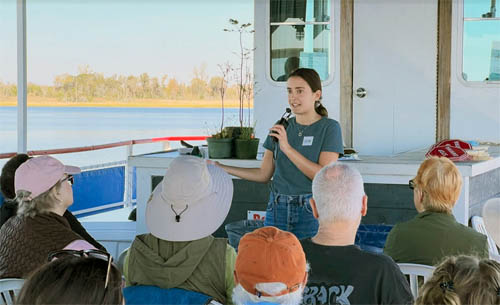 RCC campus member, Associate Professor Etsuko Kinefuchi of UNC - Greensboro brought a van-load of her students across North Carolina to join in directly observing the effects of wood pellet production through clear-cutting forests by the Enviva Corporation, a leader in wood pellet production at industrial scale. The wood pellets are stored in huge domes in the Port of Wilmington before being shipped to Europe for burning to produce electricity. The UNC-Greensboro contingent joined an RCC Cape Fear River cruise aboard the riverboat, Henrietta, where RCC Assistant Director, Claudia Steiner, led participants in learning about wood pellets, a growing source of pollution and global climate change. RCC campus member, Associate Professor Etsuko Kinefuchi of UNC - Greensboro brought a van-load of her students across North Carolina to join in directly observing the effects of wood pellet production through clear-cutting forests by the Enviva Corporation, a leader in wood pellet production at industrial scale. The wood pellets are stored in huge domes in the Port of Wilmington before being shipped to Europe for burning to produce electricity. The UNC-Greensboro contingent joined an RCC Cape Fear River cruise aboard the riverboat, Henrietta, where RCC Assistant Director, Claudia Steiner, led participants in learning about wood pellets, a growing source of pollution and global climate change. | | | | | | Rachel Carson Reading For Students and Faculty 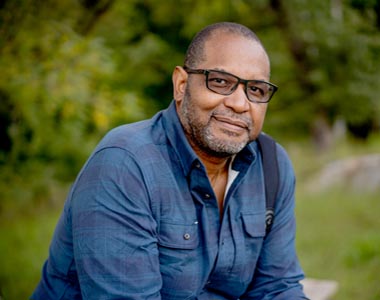 RCC National Advisory Council member and Clemson University biology professor, Drew Lanham, has been a named 2022 MacArthur “genius” Fellow. Here is how he imagines a conversation between two of his heroes, Dr. Martin Luther King, Jr., and Rachel Carson. RCC National Advisory Council member and Clemson University biology professor, Drew Lanham, has been a named 2022 MacArthur “genius” Fellow. Here is how he imagines a conversation between two of his heroes, Dr. Martin Luther King, Jr., and Rachel Carson.
A Convergent Imagining –
What if Rachel Carson and Martin Luther King Jr. Had Met?
 What if Dr. Martin Luther King Jr. and Rachel Carson had met? Imagining an exchange in the year 1964, as the civil rights and environmental movements were forging parallel and increasingly urgent paths into American culture, J. Drew Lanham explores the power and necessity of convergence. What if Dr. Martin Luther King Jr. and Rachel Carson had met? Imagining an exchange in the year 1964, as the civil rights and environmental movements were forging parallel and increasingly urgent paths into American culture, J. Drew Lanham explores the power and necessity of convergence.
Dear Miss Carson, Rachel, if I might? Hoping you are well in these turbulent times. I am fine but feel now pressed to do even more after this last attempt at silencing me came so close. Read more | | | | | | Search For Environment/Cancer Links at RCC Campus - Yale University Yale Superfund Research Center to Investigate Water Contaminants Linked to Cancer 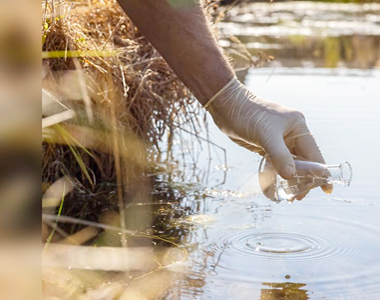 The National Institute of Environmental Health Sciences recently awarded Yale a $7.35 million grant to support the research program over the next five years. The multidisciplinary center — one of 25 university-based Superfund Research Centers around the country — will be led by scientists at the Yale School of Public Health (YSPH) and Yale School of Engineering & Applied Science. Researchers from the Yale School of Medicine and Yale School of the Environment also will be involved. The National Institute of Environmental Health Sciences recently awarded Yale a $7.35 million grant to support the research program over the next five years. The multidisciplinary center — one of 25 university-based Superfund Research Centers around the country — will be led by scientists at the Yale School of Public Health (YSPH) and Yale School of Engineering & Applied Science. Researchers from the Yale School of Medicine and Yale School of the Environment also will be involved.
“Given that liver cancer incidence rates have more than tripled since 1980, there is an urgent need to evaluate whether emerging water contaminants may be contributing to this increase,” said Vasilis Vasiliou, chair of the YSPH Department of Environmental Health Sciences and Susan Dwight Bliss Professor of Epidemiology. Read more 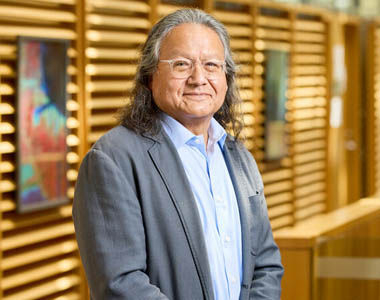 RCC Campus Network member Yale University is also hosting a series of expert lectures on climate change through its alumni network. The series is free and open to the public. Click here to learn more and register RCC Campus Network member Yale University is also hosting a series of expert lectures on climate change through its alumni network. The series is free and open to the public. Click here to learn more and register | | | | | | U North Carolina Asheville Connects 26 KW Solar Project UNC Asheville celebrated the installation of its second solar panel array with a ribbon cutting at the University’s Reuter Center, home of the Osher Lifelong Learning Institute, on Sept. 23, 2022. This 26-kW solar installation will double UNC Asheville’s current solar power production and propel the University towards its commitment to be carbon neutral by 2050. The 64-panel solar array will produce 37,000 kWh annually, or about 17 percent of the annual electricity needs of the Reuter Center. | | | | | | U Hawaii Leads $40M Grant for Climate-Smart Food Production A team of University of Hawaiʻi at Mānoa researchers is the scientific/creative lead on an up-to $40-million U.S. Department of Agriculture (USDA) grant to assist Hawaiʻi farmers, ranchers and foresters in implementing sustainable, climate-smart practices and establishing stronger markets that live beyond the life of the grant for locally produced, healthy food and forest products. The grant funding will be administered through the Lynker Corporation Pacific Islands and West Coast Division, based in Hawaiʻi, managed by Lynker’s Christopher Hawkins. | | | | | | Bucknell U Connects 1.76 MW Solar Array Bucknell University and Encore Renewable Energy of Burlington, Vt., are celebrating the completion of a 1.76 peak megawatt solar array now in place on Bucknell's campus. Bucknell and Encore, the project's vendor, will formally mark the completion of the array — which will supply up to 7% of the University's electricity and will move Bucknell a step closer to achieving its goal of carbon neutrality by 2030 — with a public dedication at the project site on Thursday, Oct. 6, at 2 p.m. The array is scheduled to come online in the coming weeks. | | | | | | Valparaiso U Receives $300K for Microplastics Research Microplastics — tiny fragments of plastic materials that have shattered into microscopic size pieces over time — have been making headlines in recent years for the sheer amount of it being found in all parts of the world. A brief glance at the headlines shows growing concerns about the concentration of this pervasive form of pollution in our oceans, our crops, and even our bodies. However, while concern about the implications of microplastics has only cropped up in the last two decades, the pollutant itself is anything but new. | | | | | | | | Is Climate Change Changing the Birds We See? Breaking news! A bird you have never seen or heard before is going extinct in a remote part of the world! While I am sure we can all agree that it is terrible for these birds, we can still enjoy the beauty of our most beloved backyard and local birds without experiencing the loss of those more exotic ones. Nevertheless, I hate to be the bearer of bad news. Climate change is a threat to all species, whether or not we can directly see its impacts. Think of a relaxing day on the beach, watching Piping Plovers and Sanderling frolic along the sand. | | | | | | Is There Space for Joyful Environmental Justice Work? Environmental justice is necessary for the full flourishing of human and non-human nature. The urgency is real and needed. Structural inequalities lead to environmental disruptions affecting our food, soil, water, climate, work, and production and consumption systems that harm the most vulnerable. At the same time, those with class, ethnic, racial, gender, and other privileges have greater access to environmental goods, such as pollution-free neighborhoods, healthy food, safe workplaces, and green spaces. This is the essence of injustice. | | | | | | Do Hurricanes Discriminate? Growing up by the beach near Wilmington, North Carolina and running through wetlands as a child was a privilege. Looking at the world around you, seeing the water glisten in the early morning, watching the herons fly overhead, and in the distance, being able to hear the slow, steady roll of the waves crashing on the shore of a not-so-distant barrier island. Once you realize this gem is your home, you develop a love for it like no other. You also learn how dynamic nature can be as you watch the ocean change its mood from a raging sea to a glass-covered pond in a matter of days. | | | | | | | | Students Awarded National Fellowship To Support Environmental Advocacy Work – Susquehanna University RCC Fellows Calli Lambard and Grant Rowe are developing their podcast Big World, Small Bites on how to integrate environmental work into daily life. Big World, Small Bites will cover how seemingly large environmental problems can be broken down into small solutions,” Rowe, of Selinsgrove, PA, said. “Using sustainable action at SU as a case study, we will discuss major changes our school has made and tell students and the community how they could make that change themselves.” Big World, Small Bites will be available on Spotify and Apple Podcasts. | | | | | | | | The 2022 – 2023 Cohort of Rachel Carson Council Fellows 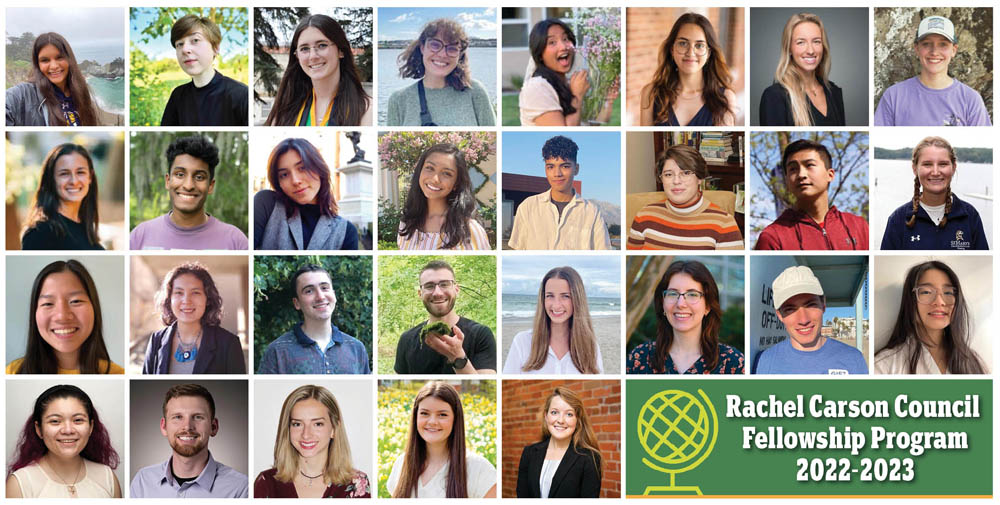 Meet our Fellows The RCC Fellowship Program is designed to identify outstanding students with a passion for environmental education, organizing, and advocacy and provide them with financial support to carry out valuable projects and campaigns on behalf of the RCC. To apply to the program, students propose their own projects that are focused on sustainability and environmental justice to be carried out on their campuses and/or the wider community. RCC Fellows become nationally-recognized environmental youth leaders. If accepted into the program, Fellows will become active members of the RCC national campus program with thousands of active faculty, students, staff and administrators at 61 campuses. Read more | | | | | | Rachel Carson Council Fellowship Featured in Greenbiz Magazine 18 Sustainability Fellowships For Students and Professionals | Greenbiz  These programs for building skills in sustainability can help make you more attractive to potential employers. And hurry, some have applications open now! These programs for building skills in sustainability can help make you more attractive to potential employers. And hurry, some have applications open now!
While there are lots of ways that you can make yourself more attractive to potential employers, few are as powerful as good old-fashioned experience. The only trick is, getting hired and gaining experience can be pretty hard to do if you don’t have, well, experience. Read more | | | | | | John More, Secretary of the Rachel Carson Council Board of Directors, and for decades one of the nation’s leading environmental attorneys and advocates, has passed away only weeks after doctors discovered that he had stomach cancer. “John was one of the most brilliant, educated, caring, compassionate, and committed people I have known,” said RCC President & CEO Bob Musil, “any conversation with him was fun, enlightening, and an interdisciplinary course connecting climate change, classics, politics, ethics and religion, grassroots environmental activism, and the need for action.” More, also a former professor of classics at Brown University, was deeply interested in helping, mentoring, and getting to know RCC’s young staff and RCC Fellows and giving them advice on organizing, coalition building, and environmental tactics and advocacy. In addition to his work with the RCC, More was a leader in community-based activities in the District of Columbia including the Washington Interfaith Network (WIN), a multi-racial interfaith grassroots organization concerned with affordable housing and neighborhood redevelopment and green jobs. “John remained committed and active to the end, connecting our young staff and Fellows to other emerging leaders and the latest and best in environmental organizing,” said Musil. More was also a founder of the Rhode Island Sierra Club and worked with Natural Resources of Maine to protect wetlands and oppose a natural gas pipeline there. In law partnership with Lee Rogers, More was regularly involved in gas pipeline issues and toxic landfills. Read more | | | | | | | | BOOK REVIEW The Pentagon, Climate Change, and War: Charting the Rise and Fall of U.S. Military Emissions. Neta L. Crawford, (MIT Press, 2022). 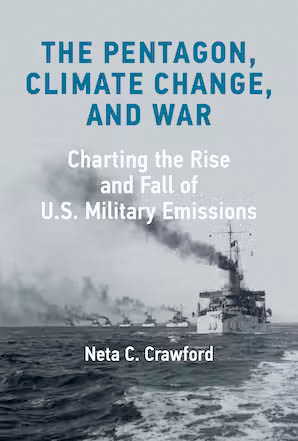 It is hard to imagine a book more worthy of being included in the core curriculum of every college or university, or, perhaps, the one required of all first-year students before they trundle onto campus. Neta Crawford’s The Pentagon, Climate Change, and War: Charting the Rise and Fall of U.S. Military Emissions (MIT Press, 2022) addresses the main “existential threats” to the United States and the world. Both climate change and war – and the strategies, alliances, armaments, and sources of energy that go into preparing for and carrying out modern conflicts — are almost impossible — outside of specialized seminars — for those prospective students to find and study as they settle into their dorms and search the catalogue on-line. It is hard to imagine a book more worthy of being included in the core curriculum of every college or university, or, perhaps, the one required of all first-year students before they trundle onto campus. Neta Crawford’s The Pentagon, Climate Change, and War: Charting the Rise and Fall of U.S. Military Emissions (MIT Press, 2022) addresses the main “existential threats” to the United States and the world. Both climate change and war – and the strategies, alliances, armaments, and sources of energy that go into preparing for and carrying out modern conflicts — are almost impossible — outside of specialized seminars — for those prospective students to find and study as they settle into their dorms and search the catalogue on-line.
Neta Crawford is the rare academic who blends meticulous research and penchant for detail with strategic vision, historical sweep, and political savvy. Crawford began her immersion into the role of the U.S. military and global climate change while looking for information on greenhouse gas emissions for a PowerPoint slide in her interdisciplinary class at Boston University. She soon discovered that the American military is the biggest user of fossil fuels and energy in the U.S. government – about 51 million metric tons each of the last two years – more than most countries in the world. | | | | | | Plan Your 2023 Campus Events with RCC now! RCC prides itself on its National Campus Network of more than 60 schools. We are working to engage faculty members, students, and administrators in our efforts for a more just and sustainable world. With our growing fellowship program, our presence on campuses across the country has never been greater. Contact RCC today to bring our staff to your campus to help find the best ways to engage your community in the efforts against climate change. Campus Visits with RCC President, Dr. Robert K. Musil 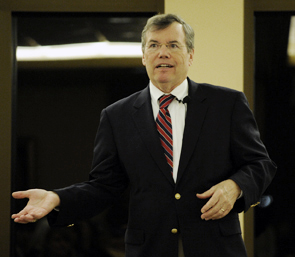 RCC President & CEO, Dr. Robert K. Musil, a national leader in climate change, environmental justice and health is again available to book for in-person campus speaking events! He has just returned from engagements at Catawba College, Duke University, North Carolina Central University, UNC-Wilmington, and the University of Wisconsin-Madison. Musil has been called “informative, challenging and inspirational all at once.” He is “motivational” with “intellectual depth” and “extraordinary impact.” RCC President & CEO, Dr. Robert K. Musil, a national leader in climate change, environmental justice and health is again available to book for in-person campus speaking events! He has just returned from engagements at Catawba College, Duke University, North Carolina Central University, UNC-Wilmington, and the University of Wisconsin-Madison. Musil has been called “informative, challenging and inspirational all at once.” He is “motivational” with “intellectual depth” and “extraordinary impact.”
Dr. Musil is available for campus lectures and visits involving classes, meetings with campus and community groups, consultations with faculty and administrators, or for Earth Day, Commencement, and other special events. Stays range from one to three days. Reduced fees are in place for 2022-2023 and can be designed to meet reduced budgets. To arrange a campus visit with Dr. Musil, contact the RCC President’s Office at office@rachelcarsoncouncil.org or call 301-214-2400.  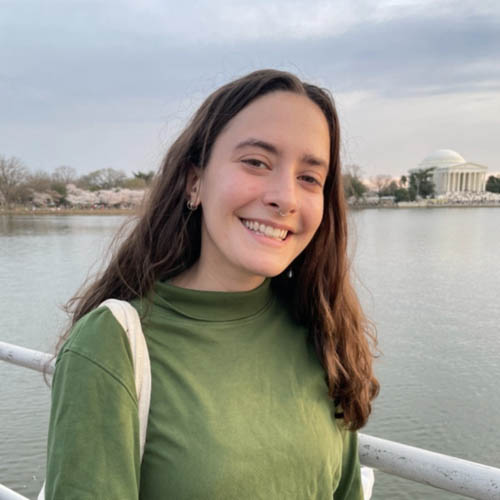 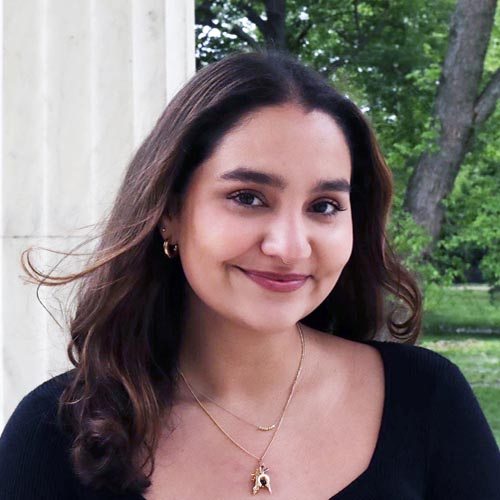 Campus Visit with RCC Staff Campus Visit with RCC Staff
The RCC also offers talks, classes, and workshops on climate justice, student engagement, activism, sustainability, and the RCC Fellowship program with Associate Director Mackay Pierce, Assistant Director, Climate Justice, Bella Jaramillo, and Assistant Director, Communications and Strategic Development, Claudia Steiner. Read about our staff here To arrange a visit, contact our Associate Director Mackay Pierce at: mackay@rachelcarsoncouncil.org | | | | | | | |  The Rachel Carson Council Depends on Tax-deductible Gifts From Concerned Individuals Like You. Please Help If You can. The Rachel Carson Council Depends on Tax-deductible Gifts From Concerned Individuals Like You. Please Help If You can. | | | |  Sign Up Here to Receive the RCC E-News and Other RCC Newsletters, Information and Alerts. Sign Up Here to Receive the RCC E-News and Other RCC Newsletters, Information and Alerts. | | | | | | | | | | | |